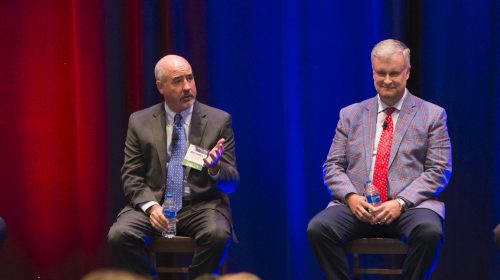The Texas Aggregates & Concrete Association sampled the current Washington, D.C. and overall market climate as part of a National Industry Leadership panel, staged last month at the Gaylord Texan resort near Dallas during the group’s 65th annual meeting.
|
|
| Panelists (from left) PCA’s Michael Ireland, NRMCA’s Michael Philipps, and NSSGA’s Michael Johnson join TACA President David Perkins, moderator. |
“If we end up after the 2020 cycle with an all-Democrat line up, we would most likely have a $2 trillion infrastructure bill passed within 90 days,” said National Stone, Sand & Gravel Association CEO Michael Johnson. “However, it would also present a bit of a paradox because the regulatory landscape would also change dramatically, creating a situation in which we would have to be wary of unreasonable regulations and rules based upon unsound science that would make it more difficult to meet the increased demand for our products.”
“Whatever happens in the upcoming elections, we will be far more effective in achieving America’s infrastructure needs if we pool our resources,” added Portland Cement Association CEO Michael Ireland, citing among immediate examples the sharing of back-office support and other assets with the National Ready Mixed Concrete Association, plus the two groups’ planned move into Alexandria, Va., office space in the same building as NSSGA headquarters. “Together, we are a stronger force.”
NRMCA President Michael Philipps called for allocating more industry resources for promoting the advantages of concrete in vertical construction. He noted Texas among markets where NRMCA is steering more promotion resources to the low- to mid-rise building segment, especially projects in the three- to seven-story range. He also touted the Build with Strength coalition, which advocates for the use of concrete in vertical and horizontal conditions.
Panelists acknowledged the superior construction attributes of concrete, including sustainability and durability in ever more demanding environments, and the innovative work at the Massachusetts Institute of Technology-hosted Concrete Sustainability Hub. “Concrete is a low-impact material and the most used building material in the world. It is key to solving many of our infrastructure challenges,” CSHub Executive Director Jeremy Gregory, PhD told TACA members.
“We are excited about the growing collaboration among national trade associations to meet the challenges of providing the U.S. with the infrastructure it needs to grow and thrive,” concluded TACA President David Perkins. “That has a profound impact on what we do at the state level. We realize that working together, rather than individually, helps us to achieve a longer-term and more sustainable impact.”
